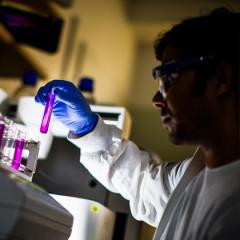Researchers studying ageing in tiny ‘live’ models of the human brain have found a key to potential treatments for Alzheimer’s and other neurodegenerative diseases.
University of Queensland scientists found that increasing levels of the ‘anti-ageing’ protein klotho reduced the deterioration in brain cells associated with age and dementia.
Professor Ernst Wolvetang and Dr Mohammed Shaker studied the protein in organoids, models that mimic the human brain, at UQ’s Australian Institute for Bioengineering and Nanotechnology.
“Our research clearly demonstrates that this protein has a powerful and direct effect on reducing the effects of ageing in the brain,” Professor Wolvetang said.
“If we can find a way to increase klotho in human brain cells, this could be beneficial in halting or slowing Alzheimer’s disease.
“Before our study, the prevailing wisdom was that klotho acts as an ‘anti-ageing’ hormone that circulates throughout the body and blocks inflammation.”
Dr Shaker used stem cell technology to grow the organoids, with the cellular make-up and architecture of a developing human brain.
“We then genetically altered klotho levels to study the effects an increase in the protein would have on organoid brain cells – and found that it slowed ageing processes by 89 per cent,” Dr Shaker said.
Discovering that organoids could model brain ageing in the laboratory was exciting for the team and important for the research community.
“The fact that we can study ageing in brain cells in the dish will enable deeper insights into the cellular mechanisms that drive these processes,” Professor Wolvetang said.
“This opens the way for testing molecules that could become potential therapeutic drugs to maintain levels of klotho in people of advanced age and in Alzheimer’s disease.”
Klotho has anti-aging effects on other types of cells in the body, with previous research showing mice that ‘overproduce’ the protein lived 30 per cent longer.
The team’s research has been published in the journal Ageing and Mechanisms of Disease. (https://doi.org/10.1038/s41514-021-00070-x)
Media: Erik de Wit, e.dewit@uq.edu.au, +61 447 305 979


